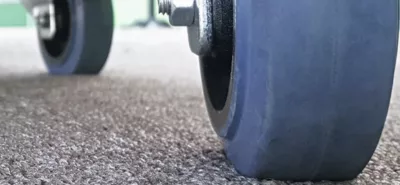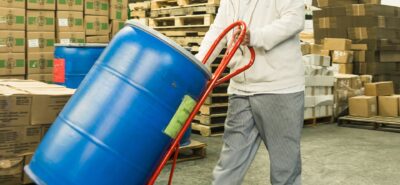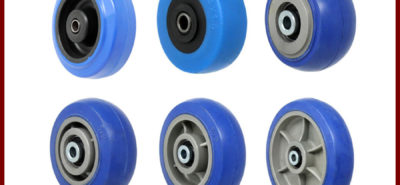
Choosing Caster Wheels for Your Butcher Shop: 3 Must-Know Considerations
Stephen Osburn2023-09-02T00:28:15-07:00Caster wheels are an essential tool for any butcher shop. Not only do they provide easy maneuverability, they also ensure a safe, sanitary, and efficient work environment. But before you choose your caster wheels, it’s important to know what makes the perfect set.
There are three critical considerations when selecting caster wheels for your butcher shop: cold tolerance, durability, and sanitation. The ability to operate in a cold environment is important because the temperatures in butcher shops can range anywhere from cold in work areas and cutting surfaces to downright frigid in walk-in freezers. Durability the ability to carry heavy loads is a priority because you want to make sure your caster wheels can withstand the daily wear and tear they’ll be subjected to in your butcher shop to protect your workers from injuries. And sanitation is essential because you want to make sure that your caster wheels are easy to clean and won’t harbor germs or bacteria that could spread throughout your food, which could make customers sick.
In this article, we will break down three things that should be considered when searching for caster wheels. By understanding these considerations, it should be easier to narrow down your options and choose the right caster wheels for your butcher shop.
Caster Wheels Must Perform Well in Cold Environments

There are many important factors to consider when choosing caster wheels for your butcher shop. One factor is how well your caster wheels will perform in the cold. The work areas in butcher shops are typically maintained at a temperature of 40 degrees Fahrenheit (4 degrees Celsius) and the recommended temperature for walk-in freezers is 0 degrees Fahrenheit (-18 degrees Celsius). Due to the perpetual cold, you want to make sure your wheels can withstand the low temperatures.
If your caster wheels aren’t built to withstand cold temperatures, they’ll stop working. And if your wheels stop working, your workers won’t be able to move heavy items like meat grinders and heavy wooden blocks used to cut meat. This can create a safety hazard as workers may try to lift and carry these items manually, which can cause strain and injury. Also, manually moving heavy items can create a sanitary hazard as well. Your workers’ hands can come in contact with bacteria and germs from the items being carried, and if they aren’t wearing proper hand protection, these contaminants can spread to the meat.
Given the unique environmental conditions of butcher shops, it is essential for casters wheel materials to possess a certain degree of thermal resistance. Thus, the most ideal material for such wheels would be one which is capable of withstanding extreme cold temperatures without compromising its structural integrity. This indicates that rubber, phenolic resin, and polyurethane caster wheels and stainless-steel casters are particularly well-suited for butcher shop use due to their superior temperature resistance capabilities.
Caster Wheels Must Move Heavy and Dangerous Equipment Safely
Another critical consideration when choosing caster wheels for your butcher shop is the ability to move heavy and dangerous equipment safely. This includes equipment like heavy carts used to transport beef, pork, poultry, and seafood, and heavy duty meat slicers or even conveyor machines used to move meat through the production process.
If your wheels aren’t built to safely move these items, they can cause serious injuries to your workers. Heavy duty meat slicers and conveyors are often pushed and pulled by workers to get them where they need to go. If the wheels on these carts aren’t built to withstand the weight, they can collapse or lose their ability to roll, which again could result in injury.
The most popular caster material used by butchers in the industry is stainless steel. Stainless steel offers excellent structural integrity and is strong enough to support heavy loads without breaking or bending under pressure. Stainless steel casters are also resistant to rust and corrosion, so they last longer.
Caster Must be Easy to Clean and Sanitize

The last critical consideration when choosing caster wheels for your butcher shop is their ability to be easily cleaned and sanitized. This is because the wheels will be in constant contact with meat and other animal byproducts and if your caster wheels are made of porous material, your caster wheels will be a breeding ground for germs and bacteria. If the wheels aren’t easy to clean, this can lead to food contamination and the spread of bacteria.
To clean your wheels, you’ll want to use an enzymatic solution or high-pressure-spray that has been proven to kill bacteria and germs on porous surfaces like meat and you’ll need a wheel that doesn’t breakdown from the solution or pressure wash. You’ll also want to use a high-pressure cleaning system that sprays the solution onto the wheels and gets into all the nooks and crannies. The high-pressure cleaning system can help ensure all the wheels are sufficiently cleaned and that there isn’t any buildup of bacteria or germs.
The easiest caster wheels to clean and sanitize are made of steel and stainless steel. These wheels can be pressure washed to remove any dirt, grime, and bacteria that has accumulated. If a wheel is made of aluminum, you’ll need to use an enzymatic cleaner or steam cleaning system so that the wheel doesn’t break apart.
Conclusion

When selecting materials for casters wheels that are to be used in cold butcher shops, a multifaceted analysis should be conducted. Rigidity and low temperature resistance should be of paramount importance as these qualities will ensure that the wheel remains structurally sound during operation in a cold environment. Additionally, corrosion resistance is of great importance as the wheel must remain resilient against any degradation caused by chemical contaminants in the air or on the floor.
The most ideal material for caster wheels in cold butcher shops is one that has good thermal conductivity and low coefficient of friction. The caster wheel should also have good mechanical strength to ensure it can carry a load without deforming. For heavy casters, a polyurethane wheel is ideal because of its resilience to temperature fluctuations and its exceptional resistance to abrasion and wear.




